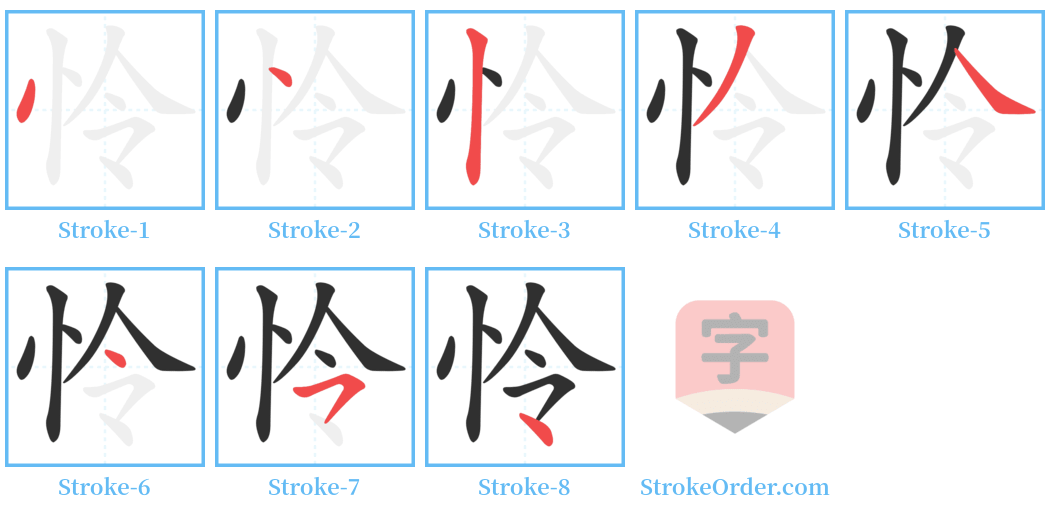怜 Stroke Order
Animated Stroke Order of 怜

Stroke Order Diagrams for 怜

Step-by-Step Handwriting Guide for 怜

Learn to Write Chinese Characters with Video Tutorials
Watch the video of writing the Chinese character "怜", learn the correct stroke order (笔顺) of the character "怜", and master the standard way of writing the character "怜".
Free Printable Handwriting Practice with Stroke Order: 怜
Printable Writing Practice Worksheet of "怜" in Portrait Orientation (Tian Zi Ge)

Printable Writing Practice Worksheet of "怜" in Landscape Orientation (Tian Zi Ge)

Information of 怜
Pinyin
lián
Radical
忄
Strokes
8 strokes
Usage
★★★★★
Definition
to pity
怜
lián
[动]
【本义】: 哀怜,怜悯
Original meaning: pity, compassion
【造字法】: 形声。从心,粦声。
Character formation: phonetic-semantic; composed of "heart" (心) and the phonetic component (粦).
【义项】
1. 可怜;同情。 [En.] pity
- 例如: 可怜 (to be pitiful); 怜悯 (to be compassionate); 可怜 (worthy of pity); 同病相怜 (to sympathize with similar suffering).
Example: 可怜 (to be pitiful); 怜悯 (to show compassion); 可怜 (worthy of pity); 同病相怜 (to have mutual sympathy for similar suffering).
2. 爱。 [En.] love
- 例如: 爱怜 (to love dearly); 怜才 (to cherish talent); 怜爱 (to love and care for); 怜香惜玉 (to cherish the beautiful, specifically in terms of women).
Example: 爱怜 (to love dearly); 怜才 (to cherish talent); 怜爱 (to love and care for); 怜香惜玉 (to cherish precious beauty, especially referring to women).
3. 通“吝”。吝惜。 [En.] stint
- 例如: 怜下 (to be considerate of subordinates); 怜嗟 (to lament and cherish); 怜察 (to perceive and cherish feelings).
Example: 怜下 (to pity the lower ranked); 怜嗟 (to lament and cherish); 怜察 (to understand and show compassion).
4. 遗憾。 [En.] deplore; regret; sorrow over
- 例如: 怜悯 (to feel regret); 所怜者 (those who are pitied).
Example: 怜悯 (to feel regret); 所怜者 (those who are to be pitied).
【引】
1. 《说文》:憐,哀也。从心。粦声。字亦作怜。
From "Shuowen": 憐 means to pity, derived from the heart. The character can also be written as 怜.
2. 《尔雅》:矜憐抚掩之也。
From "Erya": It means to show pity and comfort.
3. 《史记·魏公子列传》:独不怜公子姊邪?
From "Records of the Grand Historian": Don’t you pity the son of the prince?
4. 韩愈《应科目时与人书》:若俯首贴耳,摇尾而乞怜者,非我之志也。
From Han Yu: To lower one's head and beg for pity is not my intention.
5. 《史记·淮阴侯列传》:且喜且怜之。
From "Records of the Grand Historian": Both pleased and pitied.
6. 《史记·郦生陆贾列传》:天子怜百姓新劳苦,故且休之。
From "Records of the Grand Historian": The emperor felt pity for the people's new hardships, and thus chose to ease their burdens.
7. 清· 袁枚《祭妹文》:所怜者。
From Yuan Mei: Those whom I sympathize with.
【例】
又如: 可怜(值得怜悯); 怜见(哀矜,怜悯); 怜拯(怜悯拯救); 怜鉴(哀怜审察); 怜闵(哀怜,同情).
Examples: 可怜 (to be pitiful); 怜见 (to show compassion); 怜拯 (to rescue with compassion); 怜鉴 (to empathize and examine); 怜闵 (to pity and sympathize).
Input Method for 怜
Pinyin
lian2
Wubi
nwyc
Cangjie
poii
Zhengma
uow
Four Corner
98032
Unicode
U+601c
Same Pronunciation Characters